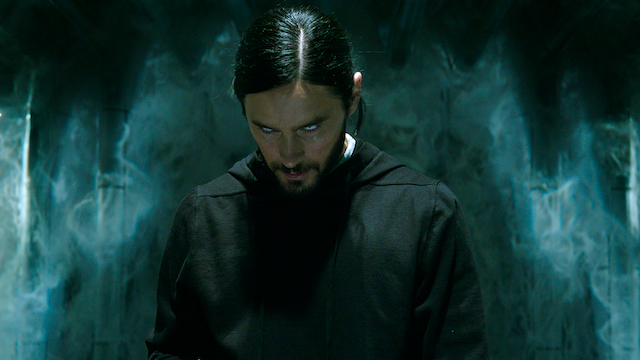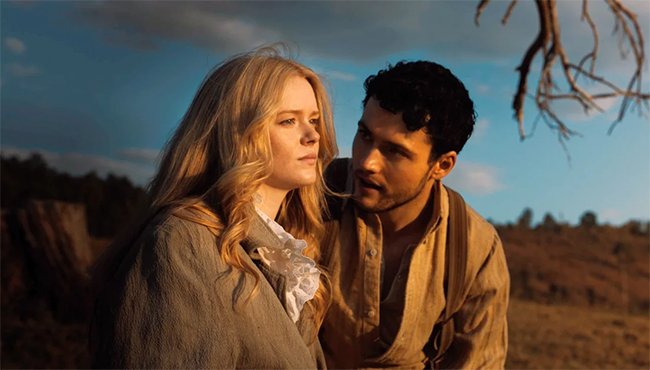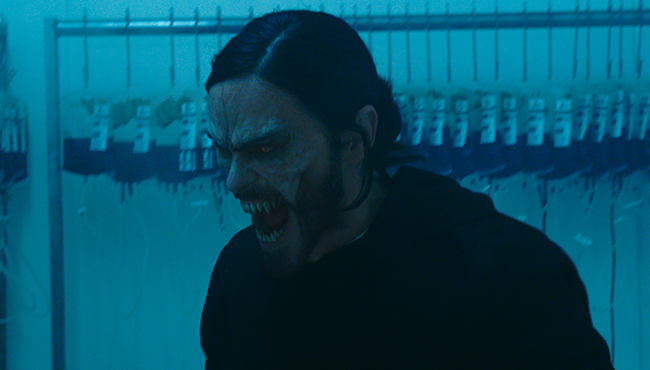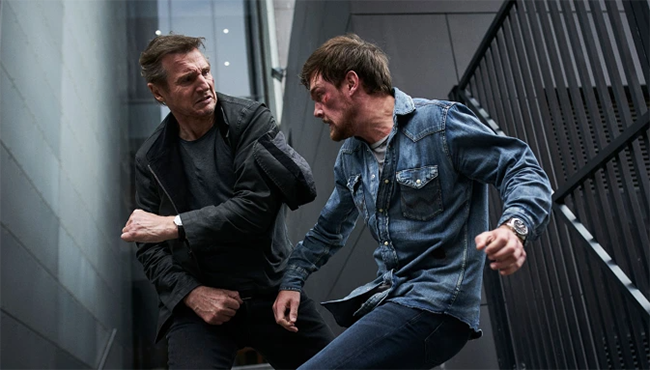Movies & TV / Columns
The Top 10 Worst Films of 2022 (So Far)
 Image Credit: Sony Pictures
Image Credit: Sony Pictures
Welcome, one and all, to part one of my Movies Mid-Year in Review for 2022! I’m your host Jeremy Thomas, and today we’ll taking a look at the worst films of the past six months before moving onto the best in the second part. Keep in mind that this list is meant to be my personal opinion and not a definitive list. You’re free to disagree; you can even say my list is wrong but stating that an opinion is “wrong” is just silly. With that in mind, let’s get right into it!
2022 has been a year of recovery at movie theaters. Following last year’s relative return to a sense of normalcy, 2022 has been full speed ahead as the industry tries to reckon with the changes that the pandemic brought including the ascension of streaming and how far to pull back from the dissolution of theatrical windows. Things seem to be at a pretty decent balance right now, which means that normalcy has allowed movies both good and bad to return to theaters. But there have also been plenty for home viewing as well, and 2022 has thus far seen disasters in both modes of viewing from wannabe superhero films to romantic dramas, horror and more. There are some very, very bad movies in here, so enough build-up; let’s rip the Band-Aid off and get into it.
Caveat: My criteria for inclusion is pretty simple: if a film was released in theaters in any remotely significant capacity, or if it was a high-profile and marketed release on VOD or a major streaming service, then it was eligible. I don’t include films that are purely straight-to-video and may have a star or two but is essentially being shoveled out to reap in some profit on some name value. 2020 examples of this include The Requin (Alicia Silverstone) and Brazen (Alyssa Milano). There’s obviously some wiggle room on some of these and people may debate if some films are really “high-profile releases,” but that’s why it’s my list.
The only other caveat is that try as I might, I have not seen everything that was released this year, especially factoring in streaming services. The films that I have thus far missed that could have possibly qualified based on reputation are The Bunker Game, The Man From Toronto, Senior Year, Alice, and 365 Days: This Day. For those curious, I have seen a total of 77 films that have been released in 2022 so far.
Just Missing The Cut
• Choose Or Die
• Home Team
• The 355
• Fantastic Beasts: The Secrets of Dumbledore
• The Bubble
#10: Redeeming Love

I know that Redeeming Love absolutely has an audience out there it is perfect for. There are people who will call this movie inspiring and a powerful statement. And more power to them; there’s nothing wrong with that. I, however, am not one of those people. This “romantic” drama, based on Francine Rivers’ 1991 novel, has a very good cast for the most part. That includes Abigail Cowen as the lead, a sex worker named Angel in 1850s who finds the prospect of a new life after Michael (Tom Lewis, somewhat less compelling) sees her in a window, interprets it as a sign from God, and decides to marry her. The problem isn’t the cast here, nor even the production elements which are fine for the most part. (The score is solid, the cinematography is decent with a few high points, the rest of perfectly okay.)
No, the problem with this film is the script, which like its source material is a loose adaptation of the Biblical story of Hosea. Hosea’s story, in which he is commanded to marry a promiscuous woman, is a metaphor for a nation’s abandonment of God, but it seems Rivers (who also co-wrote the script) either missed that or doesn’t care. Either way, she humanizes the woman in the story by piling tragedy porn into Angel’s backstory including sex slavery, assault, medical abuse and just about everything else. The result is a story that has an extremely simplistic notion toward all of its characters — not a surprise, because the original metaphors isn’t fleshed out and was never intended to be.
Look, you can tell stories inspired by this source material and do it well. This? This doesn’t do it well. D.J. Caruso is a decent director, but he doesn’t do much to elevate the material here. It all comes off as tone deaf moralizing — better than Pinnacle Peak (previously known as PureFlix)’s other efforts like the God’s Not Dead films, but that if that’s the best thing you can say about a movie than you have found the textbook definition of “damning with faint praise.”
#9: Moonfall

If there are two things I think most of us can agree with regarding Roland Emmerich, it’s that he loves blowing up the world and that he has made some very dumb movies over the years. That’s not entirely a critique; admittedly, many of those dumb films have been quite entertaining. Independence Day and The Day After Tomorrow are examples of peak Emmerich, where he destroys everything in sight in ridiculous ways but still manages to be entertaining, physics and logic be damned. On the flip side, there are also the disaster (not in a good way) movies: 2012, Godzilla, Independence Day: Resurgence — you know the drill.
With Moonfall, Emmerich has truly outdone himself. Sadly, that’s not in terms of entertainment value, but only the dumbness. This batshit crazy disaster action flick has a plot where the moon is a machine and something is crashing it into the Earth, leaving the literal fate of the world in the hands of two discredited guys and the NASA deputy director willing to give them a shot. Every moment of this movie is based on nutty, screwy logic – which is fine. The problem is that it’s so damned rote and by-the-numbers for Emmerich. This is essentially the plot of Independence Day done worse, with less interesting characters and worse pacing.
The cast does what they can with this one, but neither the space mission nor what’s happening on Earth are interesting except for the brief times it goes super-loopy. Sure, the effects are good (they should be, considering how much they cost) but they’re not in service of much in the way of fun. Moonfall is one of those movies where I legitimately cannot believe that a studio shelled out almost $150 million for this level of bland. Its worst crime is that outside of the wild plot points – which don’t hit the way they should in order to be fun – this is perhaps Emmerich’s most forgettable film. And when 10,000 BC and 2012 exist, that really says something.
#8: Morbius

It’s Morbin’ Time! Okay there, we’ve gotten the meme out of the way and can get to the actual movie itself. Morbius is the latest proof that Sony is stuck in the past when it comes to their superhero franchises. I don’t hate the Sony Spider-Man Universe as a whole, but even its other films are okay at best. Venom managed to get by on its weirdness and the buddy cop/gay romcom vibes between Eddie and Venom, which paper over its CGI flaws and busted storyline. Jared Leto’s turn at bat (pun intended), on the other hand, feels less like it should be brushing up against the MCU and more like it should be prepping a crossover with Ben Affleck’s Daredevil and Nicolas Cage’s Ghost Rider. This dour vampire comic book adaptation from Daniel Espinosa has its head firmly stuck in the past with a goofy-yet-dour approach, bad CGI, and uninteresting characters. It feels like a pre-MCU film in all the worst ways.
That’s unfortunate too, because it feels like all the elements should be there. Say what you will about Jared Leto, but he looks the part and doesn’t do a bad job as the titular doctor-turned-pseudo vampire. And Matt Smith is once again doing work better than his movie deserves, having a blast as the villainous Lucian/Milo. But the story is paint-by-numbers in the extreme and is too obsessed with its own seriousness to wring any joy out of what should be a pretty fun concept. The characters are barely people outside of Morbius and Milo, and even they shuck any sense of depth when the plot takes precedence. Adria Arjona’s science-y love interest and Jared Harris’ father figure fail to make any real sort of impression, and the less said about its very tenuous, nonsensical MCU connections the better. (At least those are brief.)
I came into Morbius with low expectations to be honest. My hope was that if it wasn’t good, I might find some fun hiding somewhere in the recesses of the runtime. For the most part, that’s a “no such luck” situation. The approach to the visual effects is fine, but I can’t stress enough how much the execution reminded me of the first Ghost Rider movie and some of the lower superhero films from that mid-2000s era. This is maybe worth watching for Smith’s wild performance, but as an attempt to expand Sony’s Spidey cinematic universe it’s an outright failure.
#7: Memory

I appreciate that Liam Neeson is committed to doing action films as long as he can keep going with them. Why shouldn’t he? Sure, he’s 70 years old but he can still move like a man much younger and since he clearly enjoys the work, I say let him do it. I just wish he’d pick better films to do. Because there’s no getting around the fact that the last few years of Neeson action-thrillers have been particularly rough, even by the standards of some of his early to mid-2010s examples like Unknown and Non-Stop.
Memory falls right along the lines of those films. Neeson is at least giving some effort in this generic thriller with a gimmicky twist, playing a hitman with a conscience who takes revenge on bad people after he’s asked to kill a kid — oh, and he also has early onset dementia. The logline sounds very much like something you could see a studio head approving because it can be summed up in once sentence, with “…and it has Liam Neeson in it” securing the greenlight because they know it will make at least some money. But it doesn’t make it a good movie, especially when Dario Scardapane’s start-and-stop script hits most of the beats you would expect out of one of those bad examples of a straight-to-video film. I’m not sure if that’s the fault of being too faithful to the Belgian film (and novel) that it’s based off of or not being faithful enough, but either way it was on Scardapane to elevate the material and he coasts through.
Martin Campbell directed this film, which should in theory have given the movie a chance. Unfortunately, Campbell is a LONG way off from his Casino Royale days. The brief moments where it works is largely due to a cast that should be in much better movies including Guy Pearce, Monica Bellucci, Harold Torres, Taj Atwal, and Ray Stevenson. This is an action-thriller with surprisingly little action and no thrills; Neeson has a couple good moments but there’s only so much he can do here. Memory is more or less a complete misfire — and it’s not even the worst Neeson film of the year thus far (keep reading, folks!).
#6: Deep Water

The erotic thriller is generally a lost art in mainstream Hollywood. This subgenre is a favorite of mine and saw its heyday in the 1980s and 1990s with films like Fatal Attraction, Indecent Proposal, Dressed to Kill, Body Heat, and of course Basic Instinct. The first of those two films mentioned came from Adrian Lyne, who made the genre his calling card until he stepped away from filmmaking following 2002’s Unfaithful.
Now, I can both understand and appreciate that after 20 years off, Lyne would find a desire to return to filmmaking. However, for the life of me I can’t understand what it is about Deep Water that made him want to come back. Sure, the themes of this film fall right within Lyne’s wheelhouse, based on the book from Patricia Highmore about a married couple who are caught in a twisted dance of toxic monogamy. But it’s also an incredibly dull affair that retreads a lot of his previous resume with diminishing results. Lyne takes a lifeless script from Zach Helm and Sam Levinson and does very little with it, essentially just shooting the film with a workmanlike utility that shows none of Lyne’s previous visual flair. The thrill of a good erotic thriller or drama is that they’re dripping with style and suspense, with menace right around the corner. Lyne’s film has not a whiff of that during the entirety of its 115-minute runtime.
That’s not all on Lyne, because even if he tried there was only so much to do with this script. The big problem is that Vic and Melinda, the amoral central couple played by Ben Affleck and Ana de Armas, just aren’t that interesting. They’re two boringly damaged people, and the film doesn’t give us any insight into why that’s the case; they just are. Affleck and de Armas are legitimately good in their roles but that just highlights how lacking the story and characters are. And the characters around them barely register, including the litany of boyfriends that Vic scares off (or worse) despite being played by talented actors. Ultimately, Deep Water commits the worst crime an erotic thriller can be: it’s boring as hell.
#5: Umma

The biggest crime that Umma commits is that it’s in the wrong genre. Iris K. Shim’s tale of an off-the-grid Korean woman living the farm life in America with her daughter would have been great as a supernaturally tinged drama. Shim has some great ideas behind this film in terms of cultural dissonance, generational trauma, and mental health. And if it played like a drama with about 100 minutes to tell its story without the need for jump scares, there would have been plenty of opportunity to explore those themes especially with the incredibly talented cast that includes Sandra Oh, Fivel Stewart, Dermot Mulroney, and Odeya Rush.
The problem is, Umma isn’t a supernatural drama. Whether it was the case or not, this feels like a case where the studio saw how much horror is tapping into trauma over the last decade or so and decided that was the more commercially viable way to go. That results in a film where Shim isn’t able to bring her good ideas to fruition because it feels the need to insert a jump scare every 8 – 10 minutes. That means that at best, it only lightly scratches at the thematic depth it could have hit.
Don’t let this fool you, though; this focuses on horror elements, it doesn’t do a particularly good job at those either. The jump scares are half-hearted and the low budget means that when the titular ghostly mother of Oh’s character pops in, she has to be hidden to mask the poor CGI effects which means that you can barely see what’s going on. Any time the movie finds the interesting moments, they simply get enough room to breathe or develop. The end result is a depressingly unrealized film that doesn’t hit any of the goals it aims for, whether that’s to horrify or enlighten.
#4: The Cellar

Elisha Cuthbert deserves better than The Cellar. Cuthbert has been away from the horror genre for a while since her work in the mid-’00s, and why she came back to it for this bizarre mess of a film confuses me. Brendan Muldowney decided to expand his haunting little short film The Ten Steps to a feature-length project in a picture-perfect example of why some short films work best in that format. Building it out requires that Muldowney add a whole mythos around the tale of a girl who walks down a flight of steps in a cellar and goes missing. He decided to do so by throwing quantum physics, a cursed house, scary staircases, Hebrew, math equations, a demon (who isn’t a demon) and just about every horror trope in the book together in a misguided attempt to achieve a wanted final sequence.
There’s a whole clash of ideas going on here — and don’t get me wrong, that can work. But occasionally, it isn’t a bad idea to get a more stringent script editor. For a film that dives into some heady concepts around numerology and math, he doesn’t seem to have done the research needed to tie any of it together. That includes a lazy treatment of demonology that seems to have involved five seconds of Wikipedia, followed by giving up and saying, “throw the Chick tract version of the devil in, it’ll be fine!”
That last part is a minor nitpick, I acknowledge. But you know what isn’t? The fact that Muldowney doesn’t seem to bother with little details like tension, suspense, or mood. I will concede that this is a good-looking film, at least when it’s not so dark as to be incomprehensible. But that’s about all it has going for it. Cuthbert gives it a game go, but everyone else is unable to elevate their paper-thin characters. The Cellar isn’t the bottom of the barrel in terms of 2022 so far, but it’s not that far off the mark either.
#3: Firestarter

I mean, I can’t imagine many people are too surprised by this. Stephen King adaptations have been back in vogue for the past few years, but they have a fairly mixed record. For every It or Carrie there’s a Dark Tower or a Cell. Every Misery has a Dreamcatcher. And remakes of films or shows based on King’s work (with the exception of the aforementioned It films) have a spotty record even if you’re being very generous, though that hasn’t stopped Hollywood from pushing every one they can imagine into production.
That said, even the bad King movies at least feel like King movies. That’s not the case with the new Firestarter. There weren’t exactly a lot of high hopes for this remake, even to start with. While the original is by no means a top-tier Stephen King movie, it at least has some nostalgic value and a couple solid performances in it. There’s none of that in this muddled take on the material. This isn’t the fault of the cast, who try their hardest from Zack Efron as psychic father Andy to Ryan Kiera Armstrong as the titular young pyrokinetic Charlie. Instead, this failing seems to fall on the script as well as the work of director Keith Thomas. Thomas, who showed off his skills much better with last year’s The Vigil, strips any potential personality out of this film with consistently bland framing and a generic tone that robs it of its potential.
It’s an infuriating proposition, especially since the script starts to fall apart just as Thomas starts to gain a bit more spark about halfway through the film. Scott Teems has a good handle on how to set up the story, but once the chase kicks into second gear at the good Samaritan’s farmhouse, corners start to get cut willy-nilly and things barrel toward an incredibly predictable and flat finale. The supporting cast doesn’t make too much of an impression outside of an impressive Michael Greyeyes, who plays the bounty hunter sent to find Andy and Charlie. But even his role is handled poorly by the script, which doesn’t seem to know what to do with him. No one else is in the film long enough to register outside of Sydney Lemmon as Charlie’s mom and Gloria Reuben as the head of the mysterious organization hunting Charlie, and those two aren’t playing characters as much as plot devices. I’ve seen a lot of Stephen King’s films and there have been some real bad ones, but they were at least interesting. This is just…there, and that’s worse.
#2: Blacklight

It pains me to have two Liam Neeson films on this list, but here we are. Neeson has been accused of coasting through the late stages of his action-thriller career, but that’s not really fair. Even when the films themselves haven’t been particularly good like The Ice Road, Cold Pursuit, and Non-Stop, the star has always been admirably committed to the role. He may or may not be knowingly doing mediocre films, but either way he always seems to be doing them because he’s enjoying the work, not strictly for the paycheck.
Blacklight is honestly the first film where it seems like Neeson’s heart isn’t in it. Outside of a couple solid outbursts, he pretty much meanders his way through this lifeless political conspiracy action-thriller about a shadowy FBI “fixer” who uncovers a conspiracy Written and co-directed by Mark Williams, it’s the of thing where no one talks even remotely like real people and where the daughter of Neeson’s character seems to only mildly find it concerning that he’s turned his granddaughter into the most paranoid second-grader in existence.
And listen, this isn’t the film’s biggest problem, but you know a film can’t be bothered to care when it doesn’t even try to justify its title. Blacklight has nothing to do with anything in the film. It was clearly chosen just because it sounds cool – which pretty much seems to sum up how this whole movie was probably conceived.
But you know what? All of this would be fine if it wasn’t so bloody boring. This is an action thriller with only the bare minimum of action, save for a third-act sequence that is technically home invasion, but not really. Much of the remaining runtime focuses on the film’s weakest part: most threadbare shadow conspiracy ever invented for a film. There’s a lot of threats, a lot of talking around what’s going on, and a lot of high-school level politics and journalism coming out of the mouths of adults. It all adds up to one of the worst Liam Neeson films yet and a viewing experience that seems far longer than its 105-minute runtime.
#1: The King’s Daughter

The story around The King’s Daughter’s release would almost legendary if most people even knew this film existed. Filmed in 2014 and yanked just three weeks before a planned wide release in order to “finish visual effects,” this fantasy romantic drama wouldn’t see actually release until earlier this year. To give you some perspective on that, star Kaya Scodelario was single when the film began filming. By the time it released, she was married and had a six-year-old and two-year-old daughter. That should tell you everything you need to know about this one.
The only remaining mystery is why Gravitas Ventures bought it from Paramount for release at all. This massively chopped-up and loose adaptation of the novel The Moon and the Sun is a structural mess from start to finish, with painful editing work that barely leaves intact any sense of cohesion. Pierce Brosnan and Scodelario are fine as King Louis XVI and his fictional secret daughter Marie-Josephe, but their character arcs are cliched in the extreme and the film doesn’t do either actor’s performance any justice. Louis brings Marie to court to be his composer, right around the time he’s captured a mermaid to sacrifice for immortality’s sake. Marie and the mermaid (a CGI’d Fan Bingbing) become friends and you can guess where it goes from there.
It seems unfair to judge Barry Berman and James Schamus’s script, as this film seems to have whole chunks cut out in post-production tinkering. But even what we have is just not good; the dialogue is generally flat, and characterization is pat. (That includes Benjamin Walker’s sailor/love interest, William Hurt’s priest and especially Pablo Schreiber’s evil scientist/fan of ritual sacrifice.) But director Sean McNamara is doing plenty wrong here as well. He’s more interested in slow motion glamour shots of people at court than anything approaching a vision. And to make matters worse, the $40 million budget and extra eight years they had to fix any visual effects didn’t help Bingbing’s mermaid look any good. If we didn’t have Marie-Josephe and Hurt’s character regularly arguing that the mermaid has a soul, it would be hard to believe it’s true based on how she’s presented both visually and a character. While I can see why this movie got made, I can’t fathom how it ultimately got released in this final, supremely uninteresting form.
And that will do it for this! Join me next week (or perhaps sooner!) as, with the bad out of the way, we take a look at the best films of the year thus far. Until then, have a good one and don’t forget to read the many other great columns, news articles and more here at 411mania.com! JT out.







